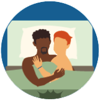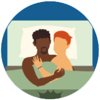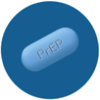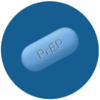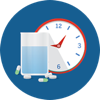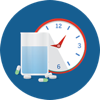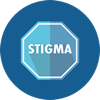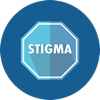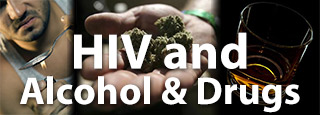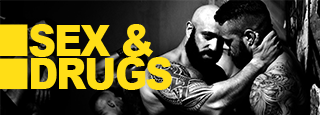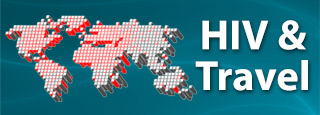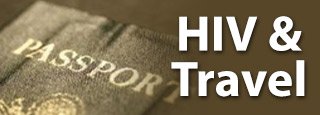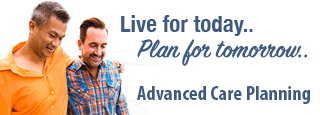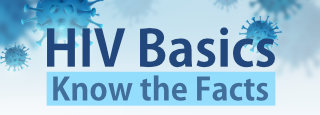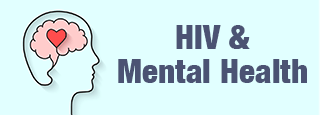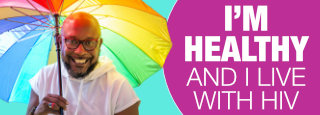HIV Prevention
Today, more tools than ever are available to prevent HIV. You can use strategies such as abstinence (not having sex), never sharing needles, and using condoms the right way every time you have sex. You may also be able to take advantage of HIV prevention medicines such as pre-exposure prophylaxis (PrEP) and post-exposure prophylaxis (PEP). If you have HIV, there are many actions you can take to prevent transmitting HIV to others.
This section answers some of the most common questions about HIV prevention.
This section answers some of the most common questions about HIV prevention.
HIV Basics | About HIV | HIV Transmission | HIV Prevention | PrEP | PEP | HIV Stigma
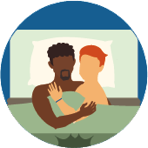
How can I prevent getting HIV?
Choose Sexual Activities With Little to No Risk
- Choose sex that is less risky than anal or vaginal sex. There is little to no risk of getting HIV through oral sex.
- You can’t get HIV from sexual activities that don’t involve contact with body fluids (semen, vaginal fluid, or blood).
- Learn more about how HIV is and is not transmitted.
Use Condoms the Right Way Every Time You Have Sex

- Condoms are highly effective in preventing HIV and other sexually transmitted infections (STIs), like gonorrhoea and chlamydia.
- Use water-based or silicone-based lubricants to help prevent condoms from breaking or slipping during sex.
- The Right Way to Use a Male Condom
- The Right Way to Use a Female Condom
Take PrEP
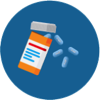
- PrEP (pre-exposure prophylaxis) is medicine people at risk for HIV take to prevent HIV.
- If taken as prescribed, PrEP is highly effective for preventing HIV from sex.
- PrEP is much less effective when it is not taken as prescribed.
- Find out if PrEP is right for you.
PEP (Post-Exposure Prophylaxis)
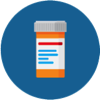
- PEP (Post-exposure prophylaxis) is a 4-week course of anti-HIV medication that is shown to be effective in preventing HIV infection if started within 72 hours of exposure.
- The key to PEP is accessing it as soon as possible after you think you may been exposed to HIV. PEP is most effective within up to 24 hours of exposure and unlikely to work if not taken within 72 hours (three days) of the suspected exposure to HIV.
- If you believe you have been exposed to HIV, or have exposed someone to HIV, access PEP from local hospital emergency department
Decide Not to Have Sex
- Not having sex (also known as being abstinent) is a 100% effective way to make sure you won’t get HIV through sex.
- You can be abstinent at different times in your life for different reasons that may change over time.
- Not having sex also prevents other STDs and pregnancy.
Get Tested and Treated for Other STDs
- If you have another STD, you are more likely to get HIV. Getting tested and treated for other STDs can lower your chances of getting HIV.
- Many people with an STD may not know they have one because they don’t have symptoms.
If Your Partner Has HIV, Encourage Your Partner to Get and Stay in Treatment
- This is the most important thing your partner can do to stay healthy.
- If your partner takes HIV medicine and gets and keeps an undetectable viral load, there is effectively no risk of you getting HIV from sex with your partner.
- Learn more about the benefits of HIV treatment as prevention.
Safe Drug Use
- Sharing drug-injecting equipment puts you at risk of HIV, viral hepatitis.
- Needles and syringes (fits): New injecting equipment should be used for every injection. These can be obtained from needle exchanges.
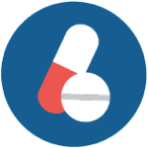
If I have HIV, what is the best way to protect others?
Get in care and take medicine to treat HIV.
- HIV medicine (called antiretroviral therapy or ART) can reduce the amount of HIV in the blood (called viral load). HIV medicine can make the viral load very low—so low that a test can’t detect it (called an undetectable viral load).
- People with HIV who keep an undetectable viral load (or stay virally suppressed) can live long, healthy lives. Viral suppression is defined as having less than 200 copies of HIV per millilitre of blood.
- If a person has an undetectable viral load, they have effectively no risk of transmitting HIV to an HIV-negative partner through sex.
- Having an undetectable viral load also helps prevent transmission to others through sharing needles, syringes, or other injection equipment, and from mother-to-child during pregnancy, birth, and breastfeeding.
- Most people can get the virus under control within six months.
- Taking ART does not prevent transmission of other sexually transmitted diseases (STDs).
Get tested for HIV so you know your status
The only way to know your HIV status is through testing. Testing for HIV is important because it enables the individual to know their status, seek treatment and support if necessary and take steps to prevent onward transmission. Gay men and other men who have sex with men are recommended to have a comprehensive sexual health check (which tests for HIV, gonorrhoea, chlamydia and syphilis) at least twice a year, and up to four times a year if they are in one or more of these categories:
- have had any condomless anal sex
- have more than 10 sexual partners in 6 months
- participate in group sex
- use crystal meth
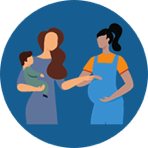
How can I prevent transmitting HIV to my baby?
Get Tested for HIV As Soon As Possible to Know Your Status
- The earlier HIV is diagnosed and treated, the more effectively HIV medicine will prevent transmission to your baby.
- If you or your partner engage in behaviours that put you at risk for HIV, get tested again in your third trimester.
- You should also encourage your partner to get tested for HIV.
Take Medicine to Prevent HIV if You Do Not Have HIV But Are at Risk
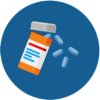
- If you have a partner with HIV and are considering getting pregnant, talk to your health care provider about PrEP (pre-exposure prophylaxis).
- PrEP may be an option to help protect you and your baby from getting HIV while you try to get pregnant, during pregnancy, or while breastfeeding.
- Find out if PrEP is right for you.
Take Medicine to Treat HIV
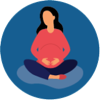
- If you have HIV and take HIV medicine as prescribed throughout pregnancy and childbirth, and give HIV medicine to your baby for 4 to 6 weeks after giving birth, your risk of transmitting HIV to your baby can be 1% or less.
- After delivery, you can prevent transmitting HIV to your baby by avoiding breastfeeding, since breast milk contains HIV.
- If your partner has HIV, encourage your partner to get and stay on treatment. This will help prevent your partner from transmitting HIV to you. People with HIV who take HIV medicine as prescribed and get and keep an undetectable viral load have effectively no risk of transmitting HIV to an HIV-negative partner through sex.
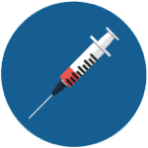
How can I prevent getting HIV from injection drug use?
Never Share Needles, Syringes, or Other Drug Injection Equipment
- Use new, clean syringes and injection equipment every time you inject.
- You can get free new needles and syringes and safely dispose of used ones via the New Zealand Needle Exchange Programme
Take PrEP
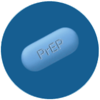
- PrEP (pre-exposure prophylaxis) is medicine people at risk for HIV take to prevent HIV.
- If taken as prescribed, PrEP is highly effective for preventing HIV from injection drug use.
- PrEP is much less effective when it is not taken as prescribed.
- Find out if PrEP is right for you.
If You Do Share Needles or Syringes, Use Bleach to Clean Them
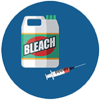
- A disinfected syringe is not as good as a new, sterile syringe, but it can greatly reduce your risk for HIV and viral hepatitis.
Decide Not to Inject Drugs
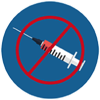
- This is the best way to prevent getting HIV through injection drug use.
- Talk with a counsellor, doctor, or other health care provider about treatment for substance use disorder, including medication-assisted treatment.
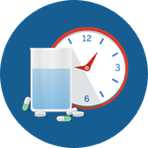
Other HIV Prevention Methods
Can I get vaccinated to prevent HIV?
- No vaccine is currently available to prevent HIV.
How can I prevent getting HIV after a recent possible exposure, like if a condom breaks or I’m sexually assaulted?
There is medicine you can take to prevent getting HIV after a recent exposure. Talk to your health care provider, an emergency room doctor, or an urgent care provider right away about PEP (post-exposure prophylaxis).
- PEP must be started within 72 hours after a possible exposure.
- The sooner you start PEP, the better. Every hour counts.
- If you’re prescribed PEP, you’ll need to take it daily for 28 days.
Can male circumcision prevent HIV?
Talk to your health care provider about the risks and benefits of male circumcision.
- Male circumcision does decrease the risk of getting HIV in some situations, but it doesn’t decrease the risk of HIV as much as other HIV prevention options.
- Circumcised men are less likely than uncircumcised men to get HIV from vaginal sex with a partner with HIV.
- Male circumcision does not decrease a woman’s risk of getting HIV.
- The benefits of circumcision for gay and bisexual men are unknown.
- Circumcised men should take other actions to prevent getting HIV or to protect their partners.
Information contained in this section is a reproduction for New Zealand of content published on the CDC (Centers for Disease Control and Prevention) Website
Join Body Positive
By becoming a member you will be able to access all the services we offer, as well as support and updates to help you live better.
Newsletter
Want to be keep up with whats happening at Body Positive?
Subscribe to our newsletter below by submitting your e-mail address.
Subscribe to our newsletter below by submitting your e-mail address.


